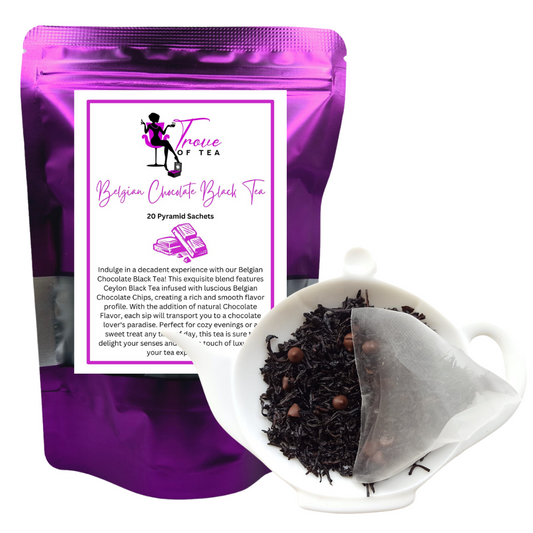
Prayers from Women That Moved God | Powerful Old Testament Prayers of Faith & Gratitude
Trove of Tea ShopShare
Before reading further, pause.
Breathe deeply. Let the noise of the day fade for a moment. Now pour yourself a cup of our Lemon Crème Black Tea, the best autumn tea to quiet the body and focus the soul. The warmth in your hands, the aroma in the air — let it remind you that peace begins when we slow down and turn our hearts toward heaven.
Whether you sit in the hush of morning prayers or the stillness of a night prayer, you are joining a long line of faithful women whose voices reached beyond their time and touched eternity.
Throughout the Old Testament, women prayed with honesty, courage, and surrender. They prayed when words were hard to find and when hope was nearly gone. Their prayers didn’t follow rituals or formulas. They came from hearts fully open — the kind of prayers that moved God.
This devotional explores six of those prayers in the Bible — intimate moments between God and women who dared to believe He was listening. As you read, keep your journal nearby. Let their stories shape your own.
1. Hannah — The Prayer That Broke Barrenness (1 Samuel 1:9–20; 2:1–10)
Hannah knew the ache of waiting. She lived with the pain of unfulfilled hope, year after year, mocked by her rival and misunderstood even in the temple. But instead of bitterness, she turned to prayer — not polite prayer, but heart-deep, trembling, tear-stained prayer.
“O Lord of hosts, if You will indeed look on the affliction of Your maidservant and remember me… I will give him to the Lord all the days of his life.” (1 Samuel 1:11)
She prayed silently, so fervently that Eli thought she was drunk. Yet her quietness was not weakness — it was strength under surrender.
“No, my lord, I am a woman of sorrowful spirit. I have poured out my soul before the Lord.” (1 Samuel 1:15)
Those words — poured out my soul — describe the purest form of prayer. It’s not a performance. It’s a pouring. And God, who hears every whisper, remembered her.
“And the Lord remembered her.” (1 Samuel 1:19)
In time, her tears turned to a prayer of gratitude: “My heart rejoices in the Lord; My horn is exalted in the Lord.” (1 Samuel 2:1)
Her pain birthed both a son and a song. Samuel would grow to guide a nation, but Hannah’s greater legacy is her faith.
Reflection: When hope feels distant, let Hannah’s honesty be your model. Pray not to impress, but to express. Pour out your heart, then rest in trust.
Journaling Prompt: What burden are you carrying silently? Write it out as Hannah might — raw, simple, real. Then add a line of surrender: “Lord, I give this back to You.”
Sip your mid autumn tea as you write — a reminder that patience, like steeping, produces richness with time.
2. Miriam — The Prayer That Danced with Gratitude (Exodus 15:20–21)
Freedom has a sound — and for Miriam, it was music.
After God split the Red Sea and Israel walked across dry ground, Miriam took her tambourine and led the women in worship:
“Sing to the Lord, for He has triumphed gloriously! The horse and its rider He has thrown into the sea!” (Exodus 15:21)
This is one of the earliest Bible verses about prayer through song. Miriam didn’t beg or plead — she praised. Her prayer of gratitude was spontaneous, celebratory, loud with joy.
She knew what it meant to wait for deliverance. She’d seen generations of slavery. So when victory finally came, she didn’t whisper thanks — she sang.
Gratitude is a kind of warfare. It pushes back despair and magnifies God’s faithfulness.
Reflection: When has God brought you through a storm? Don’t let that memory fade. Miriam’s prayer reminds us that thanksgiving should never be silent.
Journaling Prompt: List three times God made a way when there seemed to be none. Then write a few words of praise beside each one.
During morning prayers, speak those praises out loud. Gratitude is how faith breathes.
3. Deborah — The Prayer of Leadership and Victory (Judges 5:1–31)
Deborah led in a time when courage was scarce. Israel was oppressed by Canaan, its people paralyzed by fear. But Deborah, a prophetess and judge, didn’t flinch. She led with clarity and confidence grounded in God’s word.
When victory came, she didn’t boast — she worshiped. Her song, shared with Barak, resounds like thunder across generations:
“When leaders lead in Israel, When the people willingly offer themselves, Bless the Lord!” (Judges 5:2)
Her prayer in the Bible celebrates not only triumph but obedience. She understood that leadership begins on your knees.
“Lord, when You went out from Seir, When You marched from the field of Edom, The earth trembled, and the heavens poured.” (Judges 5:4)
Her strength wasn’t her own. It flowed from prayer — a living connection to divine direction.
Reflection: Leadership often feels lonely. Deborah’s prayer reminds us that power rooted in humility wins the battle long before it’s fought.
Journaling Prompt: Where is God calling you to lead? Write a prayer for wisdom and courage to step forward. Leadership is prayer in motion.
Drink your tea as you reflect — let its warmth remind you that calm leadership begins in stillness.
4. Abigail — The Prayer That Turned Away Wrath (1 Samuel 25:23–31)
Abigail entered history in crisis. Her husband, Nabal, had insulted King David — an act that nearly sparked bloodshed. Yet while others panicked, Abigail acted.
She rode out to meet King David with gifts and humility. Her prayer wasn’t from fear, but discernment:
“Please forgive the trespass of your maidservant. For the Lord will certainly make for my lord an enduring house, because my lord fights the battles of the Lord.” (1 Samuel 25:28)
Her words turned wrath into mercy. David’s anger melted at her wisdom:
“Blessed is the Lord God of Israel, who sent you this day to meet me! And blessed is your advice and blessed are you.” (1 Samuel 25:32–33)
Abigail’s prayer teaches that humility in tense moments carries divine strength. Where others react, she responded. Her intercession saved lives.
Reflection: When conflict brews, do you meet it with panic or prayer? Ask for Abigail’s grace — wisdom that softens the hardest hearts.
Journaling Prompt: Think of a relationship strained by tension. Write a prayer for peace and insight. Ask for the right words at the right time.
During your night prayer, release resentment. Let forgiveness flow like tea poured — steady, warm, healing.
5. Esther — The Prayer That Saved a Nation (Esther 4:15–17; 5:1–3)
Esther didn’t pray in the temple — she prayed in silence, in a palace filled with idols and danger. Her people faced extermination. Her only weapon was courage shaped by faith.
“Go, gather all the Jews who are present in Shushan, and fast for me; neither eat nor drink for three days, night or day. My maids and I will fast likewise.” (Esther 4:16)
Though her words are unrecorded, her faith shouted through her actions. Fasting became her language of dependence.
“So it was, when the king saw Queen Esther standing in the court, that she found favor in his sight.” (Esther 5:2)
Her humility became intercession, her stillness became salvation. Esther’s story is a call to courage — to pray, act, and trust that obedience opens doors no fear can shut.
Reflection: Sometimes faith means stepping into risk fully aware of the cost. Esther shows that favor follows faithfulness.
Journaling Prompt: Write about something you’re afraid to face. Then write this declaration beneath it: “If I perish, I perish — but I will still trust.”
In your next morning prayers, fast from distraction — even for an hour — and focus wholly on listening.
6. The Shunammite Woman — The Prayer That Refused to Quit (2 Kings 4:18–37)
The Shunammite woman’s faith was fierce and steadfast. After years of longing, God had blessed her with a son through Elisha’s prophecy. Then tragedy struck — the boy suddenly died.
She didn’t surrender to despair. She laid him on the prophet’s bed and went out to find Elisha. Her words were few but piercing:
“Did I ask a son of my lord? Did I not say, ‘Do not deceive me’?” (2 Kings 4:28)
Her determination was unwavering. She refused to accept defeat. Elisha followed her home, prayed, and the boy lived again.
“And the child opened his eyes.” (2 Kings 4:35)
This prayer is perseverance in its purest form — when faith holds on even in silence.
Reflection: The Shunammite woman didn’t pretend not to grieve. She simply refused to stop believing. Prayer doesn’t always remove pain; sometimes it carries you through it.
Journaling Prompt: Write down one promise God has made you that seems delayed. Then write this: “I will not let go until You move.”
End your day with a cup of dessert tea — slow, warm, restorative — as a symbol of rest after persistence.
The Thread That Unites These Women
Six women. Six seasons of life. One God who listens. Each of these prayers in the Bible reveals a different facet of faith:
-Hannah’s pain teaches surrender.
-Miriam’s praise teaches gratitude.
-Deborah’s leadership teaches courage.
-Abigail’s discernment teaches peace.
-Esther’s fasting teaches obedience.
-The Shunammite’s endurance teaches perseverance.
Not one of them prayed casually. They prayed with heart, humility, and holy defiance. Their prayers reached beyond their circumstances into the eternal purposes of God.
How to Pray Like the Women of the Old Testament
1. Be Honest. God doesn’t need perfect words. He desires your truth.
2. Be Still. Prayer isn’t a rush; it’s a resting conversation.
3. Be Grateful. Begin every morning prayer with thanks — gratitude realigns the soul.
4. Be Persistent. Keep coming back. God honors endurance.
5. Be Expectant. Believe He hears and acts, even when you cannot see how.
6. Create Atmosphere. Brew your mid autumn tea or Lemon Crème Black Tea before prayer. Let its aroma prepare your spirit.
7. Journal Everything. Record your prayers, tears, and answers — this becomes your living testimony.
Bible Verses About Prayer for Meditation
-“Trust in Him at all times, you people; pour out your heart before Him; God is a refuge for us.” (Psalm 62:8)
-“The Lord is near to all who call upon Him, to all who call upon Him in truth.” (Psalm 145:18)
-“The prayer of the upright is His delight.” (Proverbs 15:8)
-“Then you will call upon Me and go and pray to Me, and I will listen to you.” (Jeremiah 29:12)
-“In my distress I called upon the Lord, and cried out to my God; He heard my voice from His temple.” (2 Samuel 22:7)
Meditate on one verse each day. Write it at the top of your journal and let it guide your prayer focus.
Conclusion: When Women Pray, Heaven Moves
In conclusion, prayer is not performance — it’s presence.
The women of the Old Testament prove that God is not distant. He listens to the cry of the barren, the song of the free, the strategy of the leader, the plea of the peacemaker, the courage of the queen, and the persistence of the mother.
So, as you set down your pen or close your journal, pour yourself one last cup of Lemon Crème Black Tea, the best autumn tea to end the day. Its warmth lingers — much like prayer, whose effects remain long after words fade.
Let your night prayer be honest.
Let your faith be steady.
Let your gratitude overflow.
Because when a woman prays with a humble, whole heart, she doesn’t just speak to God - She moves Him.









